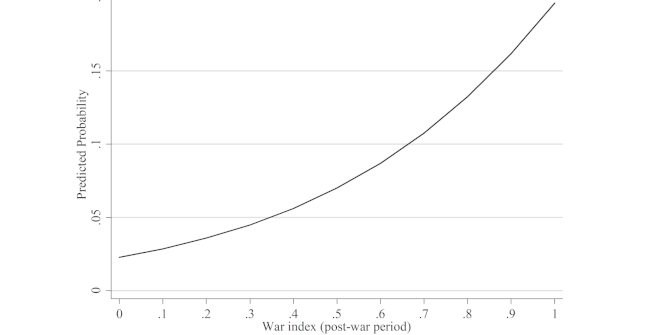
 The Second World War had a major impact on almost every aspect of European society, but one area that has been relatively under-researched is the influence the war had on social spending. Presenting results from a new study, Herbert Obinger and Carina Schmitt illustrate that World War II not only created new welfare constituencies such as disabled war veterans, but also changed politics and institutional settings in a way that facilitated the expansion of the welfare state in the post-war period.
The Second World War had a major impact on almost every aspect of European society, but one area that has been relatively under-researched is the influence the war had on social spending. Presenting results from a new study, Herbert Obinger and Carina Schmitt illustrate that World War II not only created new welfare constituencies such as disabled war veterans, but also changed politics and institutional settings in a way that facilitated the expansion of the welfare state in the post-war period.
World War II killed more than 60 million people and caused fathomless human suffering, leaving behind millions of war victims in need of social protection. Yet astonishingly, the impact of mass warfare on post-war welfare state development has rarely been examined in comparative welfare state research and the huge quantitative literature on postwar social spending almost entirely neglected war as a possible explanatory factor of social spending dynamics. In a recent study we aim to fill this gap. More specifically, we have examined macro-quantitatively whether and in what ways the Second World War affected social spending trajectories in 18 Western countries over the course of the so-called Golden Age of the welfare state (1945-1980).
Our argument is that World War II unfolded its impact on social expenditure via two channels. First, the cruelties of war generated social needs of a magnitude that inevitably required government action and therefore led to higher levels of social spending in the post-war period. In all belligerent countries, albeit to various degrees, war created new welfare constituencies such as disabled war veterans, surviving dependents of killed servicemen or war refugees. In addition, economic decline caused by acts of war and military demobilisation led to unemployment and economic deprivation that also affected the middle class. In fact, the sheer quantity of war-induced social spending is impressive. According to data from the International Labour Organisation, belligerent countries spent between 10 and 35 per cent of total social expenditure on civilian and military victims of war in the immediate post-war years.
Second, mass warfare has changed politics and institutional settings in a way that facilitated the expansion of the welfare state in the post-war period. There is considerable empirical evidence that mass warfare gave rise to enhanced state capacities (e.g. the build-up of a welfare bureaucracy), furnished governments with new fiscal powers and policy jurisdictions, propelled democratisation and electoral reform, led to a centralisation of government, and strengthened the power resources of labour in industrial relations and politics. In a similar vein, economic reconstruction fuelled rapid economic growth in the aftermath of war. In conjuncture with the tremendous social problems caused by war, these political and economic transformations very likely led to a shift in social spending in the post-war period.

Königsberg after Allied bombings, 1945, Credit: Süddeutsche Zeitung (Public Domain)
In our empirical analysis we use a newly constructed index of war intensity consisting of three different indicators to measure cross-nationally distinct aspects of warfare and occupation experiences. Our index of war intensity reveals a large variation in the extent to which the 18 nations examined were affected by the Second World War. The empirical findings of our panel regressions largely confirm the notion that war has a significant long-term impact on social expenditure. Our analysis indicates that war intensity was a key factor driving social spending dynamics until the late 1960s, suggesting that war is crucial for understanding cross-national differences in welfare efforts during the first decades following World War II.
The impact of war on social spending was strongest in countries where the homeland was a theatre of war and which suffered from many military and civilian casualties. In countries fighting overseas, i.e. most of the English-speaking countries, war-related spending was also substantial but mainly restricted to war veterans and their dependents. What emerged there in some places, such as the U.S., was a large veterans’ welfare state in parallel with a residual civilian welfare state. Not surprisingly, war hardly affected social expenditure in neutral countries.
From the 1970s onwards, however, the effect of war petered out. Such a declining war impact on social spending over time is quite plausible as the demand for social benefits decreased for demographic reasons. With the passage of time, the death of welfare beneficiaries and the loss of benefit eligibility (e.g. adult war orphans) lowered the war-related social spending commitments of governments.
However, focusing on social spending is clearly not enough for studying the war-welfare nexus. World War II also might have shaped several other aspects of social policy such as benefit generosity, coverage, the timing of welfare legislation and the patterns of welfare provision, notably the public-private mix. Systematic comparative research in these areas is still in its infancy.
Please read our comments policy before commenting.
Note: For more information, see the authors’ accompanying journal article. The article gives the views of the authors, not the position of EUROPP – European Politics and Policy or the London School of Economics.
_________________________________
 Herbert Obinger – University of Bremen
Herbert Obinger – University of Bremen
Herbert Obinger is a Professor at the SOCIUM Research Centre on Inequality and Social Policy, University of Bremen.
–
 Carina Schmitt – University of Bremen
Carina Schmitt – University of Bremen
Carina Schmitt is a Professor at the SOCIUM Research Centre on Inequality and Social Policy, University of Bremen.



